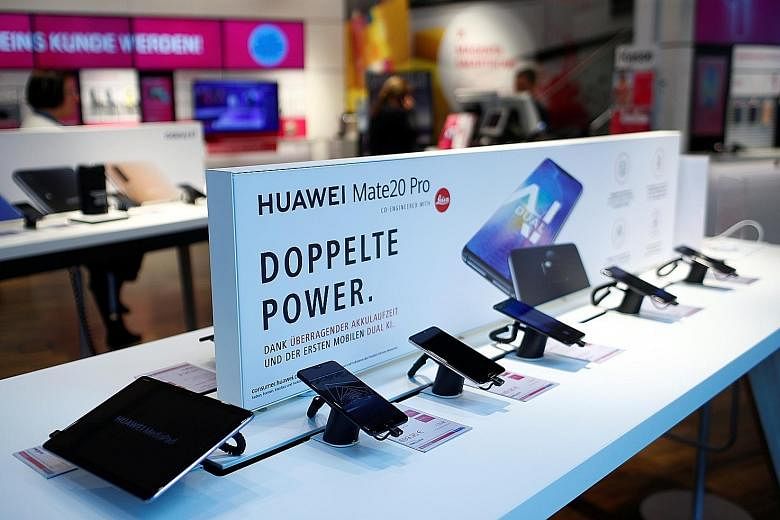WASHINGTON • A group representing top US mobile service providers urged European counterparts to be cautious in their roll-out of 5G networks, amid alleged security threats from Huawei Technologies, ahead of a conference that will highlight a US-Europe divide on the issue.
A Feb 14 release from GSMA, a London-based wireless industry group, had advised European lawmakers to think carefully about decisions that could delay the roll-out across the continent.
The statement, while not referring to Huawei directly, was clearly pointing to growing pressure on European telecommunications companies not to use the Chinese equipment supplier.
But CTIA, a Washington-based group, responded on Tuesday with its own statement, saying the GSMA "does not represent the views of all wireless operators or all regions".
The European carriers offered to cooperate with their governments in devising steps to ward off vulnerabilities.
CTIA, with members that include US market leaders AT&T and Verizon Communications, has urged US regulators to go slow in crafting rules on equipment security.
"It looks like they're scared of the impact of European policymaking on the roll-out of their 5G networks" that will offer advanced speeds, said Ms Gigi Sohn, a fellow at the Georgetown University Law Centre Institute for Technology Law and Policy, of the US group.
"It seems they're concerned that if Europe does so, it would become the de facto standard."
A GSMA spokesman said in an e-mail on Tuesday its "initial statement was clearly focused on activity in Europe and does not reflect the views of all GSMA members globally".
The group says it represents the interests of mobile operators worldwide. The group lists AT&T and Verizon as members.
The United States government is increasing the size of its usual delegation to the GSMA's annual industry conference, MWC Barcelona, to be held next week.
Huawei is also bolstering its presence at the event, setting the scene for a showdown as both sides try to win over the chief executives of the world's biggest carriers.
The US and China clashed last Saturday at a security conference in Munich over whether Huawei's equipment should be banned from future 5G networks.
US Vice-President Mike Pence said the company is required to turn over data to Beijing's security officials.
Chinese Politburo member Yang Jiechi was up next on the same stage, and said his country's law does not require companies to collect intelligence. He urged Europeans to consider whether the US had their interests at heart or its own.
Shenzhen-based Huawei has denied wrongdoing and long maintained it does not have back doors for the Chinese government, pointing out that no one has provided evidence to support such concerns.
CTIA did not specify what was objectionable in GSMA's 800-word statement. "We can achieve our 5G ambitions with a secure global supply chain that reflects national security concerns," CTIA said. "We caution against a patchwork approach of different rules for different regions, which would result in less competition in supply chains."
GSMA on Feb 14 said "mobile operators are ready to work with European agencies in charge of promoting certification and security requirements".
It recommended that "governments and mobile operators work together to agree" on a testing and certification regime for Europe.
It also noted that "actions that disrupt the equipment supply for the various segments of the network - access, transport and core - will increase costs to European operators, businesses and citizens; delay 5G deployment by years across Europe; and potentially also jeopardise the functioning of existing 4G networks, upon which 5G is intended to be built".
Restricting access to a network equipment maker would handicap Europe's progress in developing artificial intelligence, the Internet of Things and so-called big data, the group of over 750 operators said.
However, Ericsson chief executive officer Borje Ekholm pushed back on notions that restrictions on Chinese competitor Huawei Technologies would deprive European operators of the only vendor capable of delivering 5G equipment in Europe.
While it is true there is a risk Europe could fall behind on 5G, "it is not true that this is because European service providers lack access to the right technology", Mr Ekholm said in a blog post.
"We are already deploying commercial 5G equipment with front-runner customers in front-runner markets and we will be there when the time is right for 5G in each market."
Mr Eric Mangan, a spokesman for Nokia, stressed that the company has the ability to upgrade 4G equipment from any vendor to 5G, and that, like Ericsson, it is already building the new infrastructure for customers. That includes in the US market, where Huawei is effectively shut out.
BLOOMBERG

